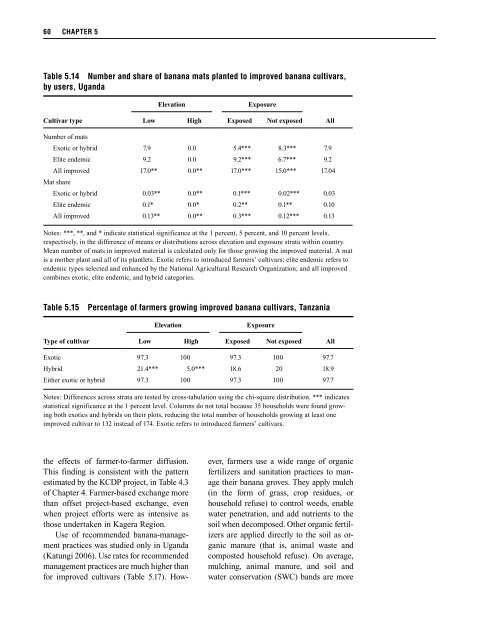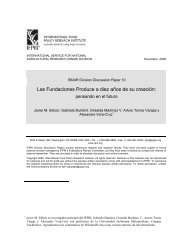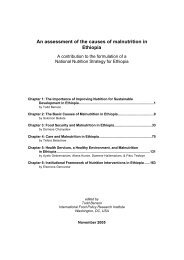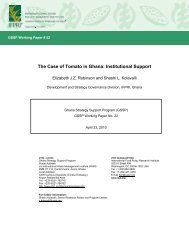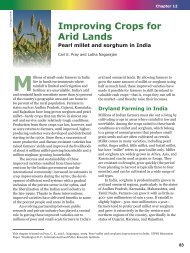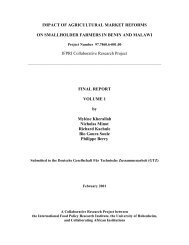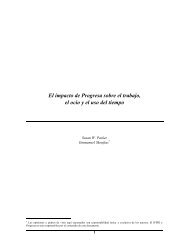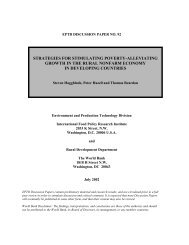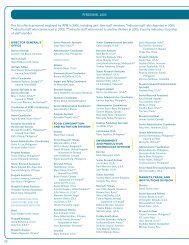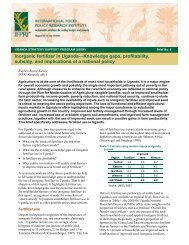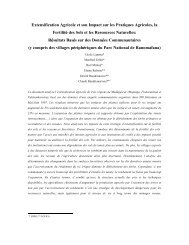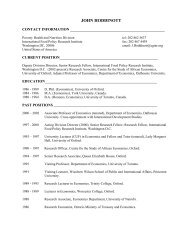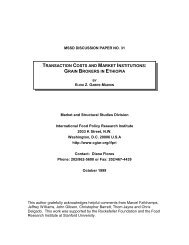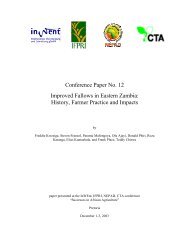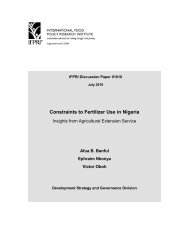An Economic Assessment of Banana Genetic Improvement and ...
An Economic Assessment of Banana Genetic Improvement and ...
An Economic Assessment of Banana Genetic Improvement and ...
Create successful ePaper yourself
Turn your PDF publications into a flip-book with our unique Google optimized e-Paper software.
60 CHAPTER 5<br />
Table 5.14 Number <strong>and</strong> share <strong>of</strong> banana mats planted to improved banana cultivars,<br />
by users, Ug<strong>and</strong>a<br />
Elevation<br />
Exposure<br />
Cultivar type Low High Exposed Not exposed<br />
All<br />
Number <strong>of</strong> mats<br />
Exotic or hybrid 7.9 0.0 5.4*** 8.3*** 7.9<br />
Elite endemic 9.2 0.0 9.2*** 6.7*** 9.2<br />
All improved 17.0** 0.0** 17.0*** 15.0*** 17.04<br />
Mat share<br />
Exotic or hybrid 0.03** 0.0** 0.1*** 0.02*** 0.03<br />
Elite endemic 0.1* 0.0* 0.2** 0.1** 0.10<br />
All improved 0.13** 0.0** 0.3*** 0.12*** 0.13<br />
Notes: ***, **, <strong>and</strong> * indicate statistical significance at the 1 percent, 5 percent, <strong>and</strong> 10 percent levels,<br />
respectively, in the difference <strong>of</strong> means or distributions across elevation <strong>and</strong> exposure strata within country.<br />
Mean number <strong>of</strong> mats in improved material is calculated only for those growing the improved material. A mat<br />
is a mother plant <strong>and</strong> all <strong>of</strong> its plantlets. Exotic refers to introduced farmers’ cultivars; elite endemic refers to<br />
endemic types selected <strong>and</strong> enhanced by the National Agricultural Research Organization; <strong>and</strong> all improved<br />
combines exotic, elite endemic, <strong>and</strong> hybrid categories.<br />
Table 5.15 Percentage <strong>of</strong> farmers growing improved banana cultivars, Tanzania<br />
Elevation<br />
Exposure<br />
Type <strong>of</strong> cultivar<br />
Low High Exposed Not exposed<br />
All<br />
Exotic 97.3 100 97.3 100 97.7<br />
Hybrid 21.4*** 5.0*** 18.6 20 18.9<br />
Either exotic or hybrid 97.3 100 97.3 100 97.7<br />
Notes: Differences across strata are tested by cross-tabulation using the chi-square distribution. *** indicates<br />
statistical significance at the 1 percent level. Columns do not total because 35 households were found growing<br />
both exotics <strong>and</strong> hybrids on their plots, reducing the total number <strong>of</strong> households growing at least one<br />
improved cultivar to 132 instead <strong>of</strong> 174. Exotic refers to introduced farmers’ cultivars.<br />
the effects <strong>of</strong> farmer-to-farmer diffusion.<br />
This finding is consistent with the pattern<br />
estimated by the KCDP project, in Table 4.3<br />
<strong>of</strong> Chapter 4. Farmer-based exchange more<br />
than <strong>of</strong>fset project-based exchange, even<br />
when project efforts were as intensive as<br />
those undertaken in Kagera Region. <br />
Use <strong>of</strong> recommended banana-management<br />
practices was studied only in Ug<strong>and</strong>a<br />
(Katungi 2006). Use rates for recommended<br />
management practices are much higher than<br />
for improved cultivars (Table 5.17). However,<br />
farmers use a wide range <strong>of</strong> organic<br />
fertilizers <strong>and</strong> sanitation practices to manage<br />
their banana groves. They apply mulch<br />
(in the form <strong>of</strong> grass, crop residues, or<br />
household refuse) to control weeds, enable<br />
water penetration, <strong>and</strong> add nutrients to the<br />
soil when decomposed. Other organic fertilizers<br />
are applied directly to the soil as organic<br />
manure (that is, animal waste <strong>and</strong><br />
composted household refuse). On average,<br />
mulching, animal manure, <strong>and</strong> soil <strong>and</strong><br />
water conservation (SWC) b<strong>and</strong>s are more


